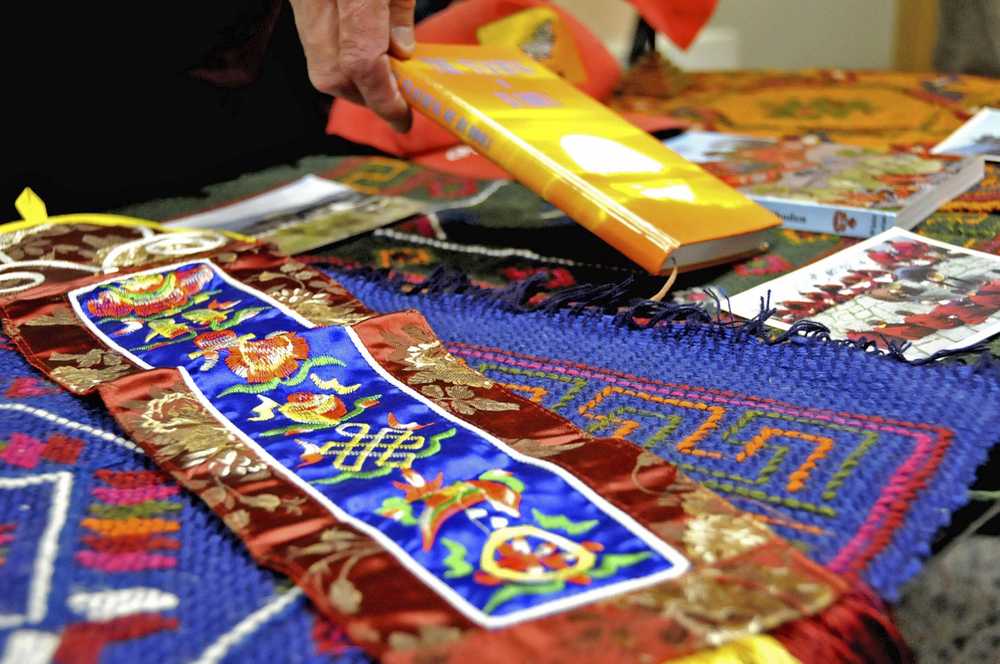KENAI — Dr. Paul Landen began training last October for hiking in the Bhutanese mountains, but the 2,000-foot climbs still took the wind out of him. But when he reached the top and saw the ancient temple perched on the mountainside, it took the breath out of him, he said.
Landen, an associate professor of psychology at Kenai Peninsula College, has been to 72 countries — so far. Traveling is a hobby as well as part of his work, but the trip to Bhutan last summer was mostly for sightseeing.
The Buddhist country is tucked in the remote foothills of the Himalaya Mountains, north of India and east of Nepal. One of the poorest countries in the world — about 12 percent of the population lived below the international poverty line in 2012, according to the World Bank — it is also reportedly one of the happiest.
Getting there was difficult — and expensive, Landen said. Foreigners are not allowed to travel unaccompanied in the country, so he had to buy a guided tour and was accompanied by two guides at all times. The small country, slightly smaller than the Kenai Peninsula, is home to more than 743,000 people, who live in a chain of valleys in the northern part of the country. The southern part of the country is impenetrable jungle, he said.
Landen, who gave a presentation about his experiences in the McLane Commons at KPC, spent 12 days walking through 17th-century Buddhist monasteries, hiking along sheer cliffs and driving along washboard roads to remote palaces. In some places, like Alaska’s moose, yaks blocked the roads and his driver had to simply wait for the massive animals to pass.
“This is a national highway,” he said, pointing to a picture of a narrow dirt road. “There just isn’t the infrastructure there.”
Originally from the suburbs of Detroit, Landen began his traveling career as a coordinator of international affairs for the Michigan State University in Detroit. While there, he traveled to various countries worldwide, including the United Arab Emirates and many countries in Europe.
His interest in international affairs began early. As a child, he voraciously read information about foreign countries, and when he was unable to find more, he wrote letters to the various embassies in Washington, D.C., requesting information about their home countries.
“This is before the Internet, so it was much harder to find information about these countries,” he said. “I still have boxes full of magazines about Mongolia.”
He aimed to become a U.S. ambassador. Eventually, when rising violence in other countries discouraged that dream, he changed his career focus to psychology. He worked as the academic counselor of the department of electrical engineering and in the Residence Life department at Michigan State University for some time before moving into international exchange programs.
He coordinated the international exchange programs at Michigan State University, Ferris State University in Big Rapids, Michigan and the University of Vermont. He moved to Alaska and joined the KPC faculty as a counselor in 2005, worked at the University of Alaska Fairbanks for two years and returned as an associate professor of psychology in 2008.
His first experience in Alaska, though, was in Bethel, as a VISTA Americorps Volunteer at the Yuut Elitnaurviat People’s Learning Center. Bethel may not be for everyone, but he said he enjoyed his time there.
“Some people will get off the plane in Bethel, look at it and then turn around and leave by the same plane,” he said. “Unless you’re there in May or June, it’s not that pretty. It’s flat. If it rains, it’s muddy.”
A specialist in cross-cultural psychology, Landen said one of the things he noticed most on his most recent trip to Bhutan was the people’s determination to modernize while still maintaining their culture. The Bhutanese still farm by hand, but listen to Indian hip-hop on radios while planting the rice paddies; in the backs of 16th-century monasteries, teenage monks lean over cell phones and dodge an older monk’s swinging prayer beads as he reminds them to continue chanting Buddhist mantras.
The country is desperately poor and has some social issues — Landen said he heard tourists screaming at hotel managers and there are few safety nets besides the monasteries to take in homeless children. A highly patriarchal country where men are given most of the privilege, there is some suppression of women’s rights. There is little infrastructure to speak of and the buildings are old, needing repairs, and he said he saw no modern farming equipment. But he said his impression was that most people were content.
Though he plans to take a break from traveling for a little while, he didn’t hesitate when an audience member asked him where he planned to go next.
“Mongolia’s next,” Landen said. “After that is the Falkland Islands. I like weird places.”

